Ten years ago, on January 26, 1998, Elliott Abrams, Richard L. Armitage, William J. Bennett, Jeffrey Bergner, John Bolton, Paula Dobriansky, Francis Fukuyama, Robert Kagan, Zalmay Khalilzad, William Kristol, Richard Perle, Peter W. Rodman, Donald Rumsfeld, William Schneider Jr., Vin Weber, Paul Wolfowitz, R. James Woolsey and Robert B. Zoellick signed their names to a letter they sent off to President Bill Clinton.
Typed on the letterhead of a 6-month-old organization, the Project for a New American Century, the final four paragraphs read:
It hardly needs to be added that if Saddam does acquire the capability to deliver weapons of mass destruction, as he is almost certain to do if we continue along the present course, the safety of American troops in the region, of our friends and allies like Israel and the moderate Arab states, and a significant portion of the world’s supply of oil will all be put at hazard. As you have rightly declared, Mr. President, the security of the world in the first part of the 21st century will be determined largely by how we handle this threat.
Given the magnitude of the threat, the current policy, which depends for its success upon the steadfastness of our coalition partners and upon the cooperation of Saddam Hussein, is dangerously inadequate. The only acceptable strategy is one that eliminates the possibility that Iraq will be able to use or threaten to use weapons of mass destruction. In the near term, this means a willingness to undertake military action as diplomacy is clearly failing. In the long term, it means removing Saddam Hussein and his regime from power. That now needs to become the aim of American foreign policy.
We urge you to articulate this aim, and to turn your Administration's attention to implementing a strategy for removing Saddam's regime from power. This will require a full complement of diplomatic, political and military efforts. Although we are fully aware of the dangers and difficulties in implementing this policy, we believe the dangers of failing to do so are far greater. We believe the U.S. has the authority under existing UN resolutions to take the necessary steps, including military steps, to protect our vital interests in the Gulf. In any case, American policy cannot continue to be crippled by a misguided insistence on unanimity in the UN Security Council.
We urge you to act decisively. If you act now to end the threat of weapons of mass destruction against the U.S. or its allies, you will be acting in the most fundamental national security interests of the country. If we accept a course of weakness and drift, we put our interests and our future at risk.
It was the opening salvo of a campaign to press forward a post-Cold War foreign policy of "Pax Americana," a world that the neo-conservatives who made up the bulk of the 25 people who signed PNAC’s statement of principles the previous June saw as a U.S. dominion. A world in which the United Nations would be irrelevant, in which any resistance to U.S. control would be smacked down unilaterally, a world run as a "benevolent global hegemony" in the words William Kristol and Robert Kagan wrote in their July-August 1996 article in Foreign Affairs, "Toward a Neo-Reaganite Foreign Policy". Among the signers of the PNAC principles who for some reason didn’t sign the Clinton letter were Jeb Bush, Dan Quayle, Norman Podhoretz, I. Lewis Libby, Gary Bauer, Frank Gaffney and Dick Cheney.
That letter was followed up by a letter in May 1998 to Senate Majority Leader Trent Lott and House Speaker Newt Gingrich. From this and other lobbying came the Iraq Liberation Act. Calling for "regime change" and the establishment of a democracy in Iraq, it was passed with the broad support of congressional Republicans and all but a few Democrats, and signed into law by President Clinton in October. As consequence, the U.S. was soon funneling millions of dollars to the Iraqi National Congress run by an exile named Ahmed Chalabi. Despite the massive four-day bombing campaign of Operation Desert Fox in December 1998, however, the PNACers got nowhere near what they wanted from Clinton, the overthrow of Saddam Hussein.
Still an advocacy-group in obscurity, these fanatics were going a good deal further than writing letters and twisting arms. On their minds was the development of a blueprint for global domination. In 2000, as part of an effort to influence the foreign policy debate during the presidential campaign, they published a white paper titled Rebuilding America's Defenses: Strategy, Forces and Resources For a New Century (pdf) that argued for massively increasing defense spending and developing the capacity to fight several major wars simultaneously. That same year, William Kristol and Robert Kagan edited Present Dangers: Crisis and Opportunity in American Foreign and Defense Policy (pdf),, with one chapter by Richard Perle, "The Prince of Darkness," called "Iraq: Saddam Unbound." The imperialist dreams and strategies expressed in these manifestoes can be traced back to ideas contained in the 1992 Defense Planning Guidance, a document written by Paul Wolfowitz and his deputy, I. Lewis Libby, in the office of then-Secretary of Defense Cheney. After being leaked to excoriating reviews in the press, President H.W. Bush ordered it to be rewritten and toned down.
Eight years later, on October 11, 2000, in the second debate with Al Gore, George W. Bush seemed to be on the same page as his father when he said he wanted a "humble" foreign policy in the Middle East, one which rebuilds the anti-Iraq coalition of the Gulf War. Exactly two months later, the U.S. Supreme Court ruled 5-4 to plop Mister Bush into the Oval Office. Soon, several members of PNAC were highly placed inside the executive branch, including Dick Cheney, the self-selected Vice President; his chief of staff and national security advisor, I. Lewis Libby; Donald Rumsfeld and Paul Wolfowitz at Defense; Richard Armitage, John Bolton and Paula Dobriansky at State; and Elliott Abrams on the National Security Council.
Shortly before Rumsfeld took over at Defense, the work of the second so-called Rumsfeld Commission was released. The first, in 1998, had dealt with ballistic missile defense. This new document called for a deepening of the militarization of space and reiterated for that arena the PNAC answer for everything: American supremacy and control backed up by unilaterally applied lethal force. While the neo-conservatives in the first few months of the Cheney-dominated Bush Administration pondered global and extraterrestrial hegemony, they ignored the ideas for counter-terrorism found in the Hart-Rudman Report and rejected the entreaties of counter-terrorism adviser Richard Clarke to pay attention to Osama bin Laden. Instead, they talked about Iraq and how to achieve what the first Bush administration had left unfinished, bringing down Saddam Hussein.
When the Towers fell on September 11, 2001, they lost no time in pressing the case. On September 20, with many of their number already highly placed in the executive branch, PNAC sent a letter to Mister Bush:
We agree with Secretary of State Powell’s recent statement that Saddam Hussein "is one of the leading terrorists on the face of the Earth...." It may be that the Iraqi government provided assistance in some form to the recent attack on the United States. But even if evidence does not link Iraq directly to the attack, any strategy aiming at the eradication of terrorism and its sponsors must include a determined effort to remove Saddam Hussein from power in Iraq. Failure to undertake such an effort will constitute an early and perhaps decisive surrender in the war on international terrorism.
It was scarcely needed. Within five hours of the attack on New York City and Washington, D.C., Rumsfeld had already ordered his aides to begin preparing attacks on Iraq. While divisions within the administration delayed the invasion for 19 months, the wheels had been set in motion. Within a year PNAC’s ideas were encapsulated in the Bush Doctrine, with Iraq the first real-world test. All the real evidence showing Saddam Hussein had no connection to the 9/11 attacks was useless against the concocted evidence the administration and its leading PNACers arrayed against doubters at home and abroad.
Now, 10 years after PNAC made its case to Bill Clinton, Iraq is in shambles, with hundreds of thousands of Iraqis dead, millions wounded, and millions displaced or in exile. The most basic amenities Iraqis had access to under their cruel dictatorship, including reliable electricity, have vanished. Meanwhile, U.S. foreign policy is a heap of smoking wreckage, its diplomacy mistrusted and in disarray, its military weakened. The families of 3934 dead and tens of thousands of wounded and mentally traumatized American soldiers face a lifetime brutally changed by the arrogance, greed and authoritarian proclivities of fanatics who thought post-Republican Rome was a good model for America today.
The experience in Iraq, the forced departure of Rumsfeld, the criminal prosecution of Libby, the National Intelligence Estimate on Iran, the partial awakening of the traditional media, and the lame-duck period associated with any president in his final year of office have all done their part to weaken the neo-conservatives. They’ve disconnected the phones at the PNAC offices. But nobody has yet put a stake through the hearts of these men and women who began their ascent to power nearly 30 years ago and have so far avoided prison.
So where are the 18 who signed that letter a decade ago?
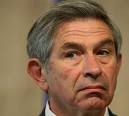 Paul Dundes Wolfowitz (born 1943). Currently: Just appointed as chairman ISAB, the State Department’s International Security Advisory Board, which advises the State Department on arms-control issues. It’s not known if he will give up his post at the American Enterprise Institute working on "entrepreneurship and development issues, Africa, and public-private partnerships." As undersecretary of Defense, he was a key architect of the war against Iraq. Author of the Wolfowitz Doctrine, aka the Bush Doctrine.
Paul Dundes Wolfowitz (born 1943). Currently: Just appointed as chairman ISAB, the State Department’s International Security Advisory Board, which advises the State Department on arms-control issues. It’s not known if he will give up his post at the American Enterprise Institute working on "entrepreneurship and development issues, Africa, and public-private partnerships." As undersecretary of Defense, he was a key architect of the war against Iraq. Author of the Wolfowitz Doctrine, aka the Bush Doctrine.
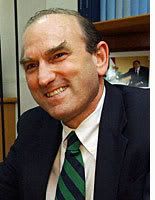 Elliott Abrams (born 1948). Currently: Appointed February 2, 2005, as Deputy Assistant to the President and Deputy National Security Advisor for Global Democracy Strategy. Previously served as Special Assistant to the President and Senior Director for Near East and North African Affairs and was Special Assistant to the President and Senior Director for Democracy, Human Rights and International Operations." Abrams avoided jail time by pleading guilty to two small-change offenses after being indicted in the Iran-contra scandal.
Elliott Abrams (born 1948). Currently: Appointed February 2, 2005, as Deputy Assistant to the President and Deputy National Security Advisor for Global Democracy Strategy. Previously served as Special Assistant to the President and Senior Director for Near East and North African Affairs and was Special Assistant to the President and Senior Director for Democracy, Human Rights and International Operations." Abrams avoided jail time by pleading guilty to two small-change offenses after being indicted in the Iran-contra scandal.
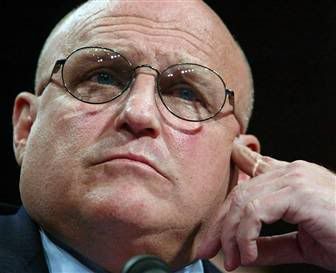 Richard L. Armitage (born 1945). Currently: Runs Armitage International, which helps clients with international business development, strategic planning, and problem-solving. Served as United States Deputy Secretary of State, the second-in-command at the State Department, from 2001 to 2005. Repudiated the Iraq war and the Bush Doctrine in 2007. Before joining the Bush administration was a board member of (DBT)/ChoicePoint Inc., a partner of data miner SAIC. Outed CIA nuclear proliferation expert Valerie Plame in 2003. As Assistant Secretary of Defense for International Security Affairs under Reagan, he was specifically named in documents at the Oliver North trial as "one of the DoD officials responsible for illegal transfers of weapons to Iran and the Contras."
Richard L. Armitage (born 1945). Currently: Runs Armitage International, which helps clients with international business development, strategic planning, and problem-solving. Served as United States Deputy Secretary of State, the second-in-command at the State Department, from 2001 to 2005. Repudiated the Iraq war and the Bush Doctrine in 2007. Before joining the Bush administration was a board member of (DBT)/ChoicePoint Inc., a partner of data miner SAIC. Outed CIA nuclear proliferation expert Valerie Plame in 2003. As Assistant Secretary of Defense for International Security Affairs under Reagan, he was specifically named in documents at the Oliver North trial as "one of the DoD officials responsible for illegal transfers of weapons to Iran and the Contras."
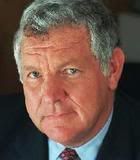 William J. Bennett (born 1943). Currently: Co-Director Empower America and EMPOWER.org, senior advisor and founder of Americans for Victory Over Terrorism, serves on the advisory council of Center for Security Policy (CSP), is the Washington Fellow for the Claremont Institute, and a distinguished fellow at the Heritage Foundation, hosts nationally broadcast radio show "Bill Bennett’s Morning in America" and appears as a CNN analyst. Was Secretary of Education and Drug Czar under Ronald Reagan and is regularly given to comments such as "Homosexuality 'takes 30 years off your life."
William J. Bennett (born 1943). Currently: Co-Director Empower America and EMPOWER.org, senior advisor and founder of Americans for Victory Over Terrorism, serves on the advisory council of Center for Security Policy (CSP), is the Washington Fellow for the Claremont Institute, and a distinguished fellow at the Heritage Foundation, hosts nationally broadcast radio show "Bill Bennett’s Morning in America" and appears as a CNN analyst. Was Secretary of Education and Drug Czar under Ronald Reagan and is regularly given to comments such as "Homosexuality 'takes 30 years off your life."
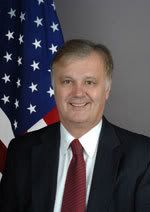 Jeffrey Bergner (born 1948). Currently: President and Managing Financial Partner of Bergner Bockorny, Inc., and an Adjunct Professor, National Security Studies Program at Georgetown University. Serves on the Board of Trustees of the Hudson Institute, is a director of the Business Executives for National Security, and Senior Fellow at the German Marshall Fund of the United States. He was one of the founders of the lobbying company, Bergner, Bockorny, Castagnetti, Hawkins & Brain.
Jeffrey Bergner (born 1948). Currently: President and Managing Financial Partner of Bergner Bockorny, Inc., and an Adjunct Professor, National Security Studies Program at Georgetown University. Serves on the Board of Trustees of the Hudson Institute, is a director of the Business Executives for National Security, and Senior Fellow at the German Marshall Fund of the United States. He was one of the founders of the lobbying company, Bergner, Bockorny, Castagnetti, Hawkins & Brain.
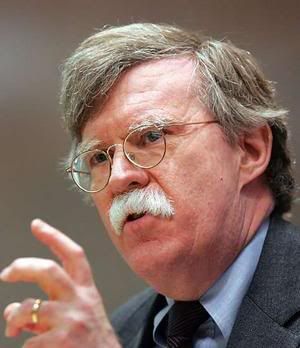 John Robert Bolton (born 1948). Currently: Just finished his book Defending America at the United Nations And Abroad and serves a senior fellow at the American Enterprise Institute. Appointed Undersecretary of State for Arms Control and International Security Appointed in May 2001, Bolton was a leading cheerleader for the war in Iraq. Appointed in August 2005, as interim ambassador to the United Nations, but failed to get Senate confirmation. Served in several State Department and Justice Department positions under Reagan and G.H.W. Bush. S. Agency for International Development. Know for irascibility and given to comments such as the one he made to the World Federalist Association in 1994: "There is no such thing as the United Nations," adding "if the U.N. secretary building in New York lost 10 stories, it wouldn't make a bit of difference." He called supporters of the nuclear test-ban treatyas "misguided individuals following a timid and neo-pacifist line of thought."
John Robert Bolton (born 1948). Currently: Just finished his book Defending America at the United Nations And Abroad and serves a senior fellow at the American Enterprise Institute. Appointed Undersecretary of State for Arms Control and International Security Appointed in May 2001, Bolton was a leading cheerleader for the war in Iraq. Appointed in August 2005, as interim ambassador to the United Nations, but failed to get Senate confirmation. Served in several State Department and Justice Department positions under Reagan and G.H.W. Bush. S. Agency for International Development. Know for irascibility and given to comments such as the one he made to the World Federalist Association in 1994: "There is no such thing as the United Nations," adding "if the U.N. secretary building in New York lost 10 stories, it wouldn't make a bit of difference." He called supporters of the nuclear test-ban treatyas "misguided individuals following a timid and neo-pacifist line of thought."
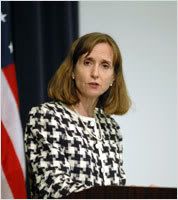 Paula J. Dobriansky (born 1955). Currently: Still in her post as Under Secretary, Global Affairs, to which she was appointed in May 2001. Most recently, she could be seen stonewalling the climate talks in Bali. Was Senior Vice President and Director of the Washington Office of the Council on Foreign Relations. Has served as Senior International Affairs and Trade Advisor at the law firm of Hunton & Williams and as Co-Chair of the International TV Council at the Corporation for Public Broadcasting." She has served in various State Department and National Security Council posts under Reagan and G.H.W. Bush. She was Foreign Policy Coordinator for Bob Dole's 1996 Campaign.
Paula J. Dobriansky (born 1955). Currently: Still in her post as Under Secretary, Global Affairs, to which she was appointed in May 2001. Most recently, she could be seen stonewalling the climate talks in Bali. Was Senior Vice President and Director of the Washington Office of the Council on Foreign Relations. Has served as Senior International Affairs and Trade Advisor at the law firm of Hunton & Williams and as Co-Chair of the International TV Council at the Corporation for Public Broadcasting." She has served in various State Department and National Security Council posts under Reagan and G.H.W. Bush. She was Foreign Policy Coordinator for Bob Dole's 1996 Campaign.
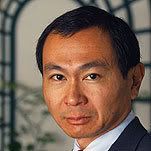 Francis Fukuyama (born 1952). Currently: Professor at the Paul H. Nitze School of Advanced International Studies (SAIS) at Johns Hopkins University. He is also a member of the President's Council on Bioethics, the Council on Foreign Relations, and the advisory boards of the National Endowment for Democracy, and the New America Foundation. Best known as the author of The End of History and the Last Man, a book that became extremely popular in neo-conservative circles. He long ago sharply criticized neo-conservative thought, called for the resignation of Donald Rumsfeld in 2003 and said he would not vote for Bush in 2004. Served on the Policy Planning Staff of the State Department of both the Reagan and G.H.W. Bush administrations, the second time as Deputy Director for European political-military affairs. In 1981-82 he was also a member of the US delegation to the Egyptian-Israeli talks on Palestinian autonomy.
Francis Fukuyama (born 1952). Currently: Professor at the Paul H. Nitze School of Advanced International Studies (SAIS) at Johns Hopkins University. He is also a member of the President's Council on Bioethics, the Council on Foreign Relations, and the advisory boards of the National Endowment for Democracy, and the New America Foundation. Best known as the author of The End of History and the Last Man, a book that became extremely popular in neo-conservative circles. He long ago sharply criticized neo-conservative thought, called for the resignation of Donald Rumsfeld in 2003 and said he would not vote for Bush in 2004. Served on the Policy Planning Staff of the State Department of both the Reagan and G.H.W. Bush administrations, the second time as Deputy Director for European political-military affairs. In 1981-82 he was also a member of the US delegation to the Egyptian-Israeli talks on Palestinian autonomy.
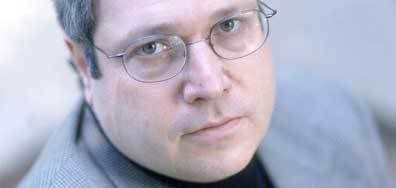 Robert Kagan (born 1958). Currently: Senior associate of the Carnegie Endowment for International Peace. A co-founder of PNAC with William Kristol, he now lives in Brussels, where his wife serves as U.S. ambassador to NATO. He worked at the State Department Bureau of Inter-American Affairs under Reagan, was the principal speech writer for Secretary of State George P. Shultz, and prior to that, was foreign policy advisor to Jack Kemp. Another member of PNAC, Robert’s brother Frederick Kagan, was the instigator of the troops "surge" in Iraq last year. Their father, Donald, was also affiliated with PNAC.
Robert Kagan (born 1958). Currently: Senior associate of the Carnegie Endowment for International Peace. A co-founder of PNAC with William Kristol, he now lives in Brussels, where his wife serves as U.S. ambassador to NATO. He worked at the State Department Bureau of Inter-American Affairs under Reagan, was the principal speech writer for Secretary of State George P. Shultz, and prior to that, was foreign policy advisor to Jack Kemp. Another member of PNAC, Robert’s brother Frederick Kagan, was the instigator of the troops "surge" in Iraq last year. Their father, Donald, was also affiliated with PNAC.
 Zalmay Khalilzad (born 1951). Currently: Permanent Representative to the United Nations, with the title U.S. Ambassador. He holds the highest U.S. office of any Muslim. Before moving to the United Nations, he served as U.S. ambassador to Iraq and as U.S. Ambassador to Afghanistan and also as Special Presidential Envoy to Afghanistan. He previously served on the National Security Council as Special Assistant to the President and Senior Director for Islamic Outreach and Southwest Asia Initiatives. He headed the Cheney-Bush transition team for the Department of Defense. In the 1990s, he was Director of the Strategy, Doctrine and Force Structure program for RAND's Project Air Force, and founded the Center for Middle Eastern Studies. He served in the State Department in the Reagan under Paul Wolfowitz and guided the program to support the mujahideen fight against the Soviet occupation.
Zalmay Khalilzad (born 1951). Currently: Permanent Representative to the United Nations, with the title U.S. Ambassador. He holds the highest U.S. office of any Muslim. Before moving to the United Nations, he served as U.S. ambassador to Iraq and as U.S. Ambassador to Afghanistan and also as Special Presidential Envoy to Afghanistan. He previously served on the National Security Council as Special Assistant to the President and Senior Director for Islamic Outreach and Southwest Asia Initiatives. He headed the Cheney-Bush transition team for the Department of Defense. In the 1990s, he was Director of the Strategy, Doctrine and Force Structure program for RAND's Project Air Force, and founded the Center for Middle Eastern Studies. He served in the State Department in the Reagan under Paul Wolfowitz and guided the program to support the mujahideen fight against the Soviet occupation.
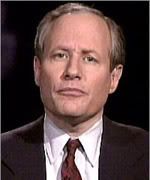 William (Bill) Kristol (born 1952). Currently: Newly minted Op-Ed columnist at The New York Times, Editor and publisher of The Weekly Standard, a political contributor at Foxaganda. He was, until the NYT gig, a columnist at Time magazine. He serves on the board of the Manhattan Institute for Policy Research and the Ethics and Public Policy Center. His father was Irving Kristol, the "godfather" of the neoconservatives. Bill Kristol was chairman and co-founder of PNAC, and one of the principle writers of "Rebuilding America's Defenses: Strategies, Forces and Resources for a New Century." He served as Chief of Staff to Vice President Dan Quayle and to Secretary of Education William Bennett under Ronald Reagan, and he led the Project for the Republican Future. His first year of graduate school, he roomed with Alan Keyes, and ran Keyes's Senatorial campaign against Paul Sarbanes in Maryland in 1988.
William (Bill) Kristol (born 1952). Currently: Newly minted Op-Ed columnist at The New York Times, Editor and publisher of The Weekly Standard, a political contributor at Foxaganda. He was, until the NYT gig, a columnist at Time magazine. He serves on the board of the Manhattan Institute for Policy Research and the Ethics and Public Policy Center. His father was Irving Kristol, the "godfather" of the neoconservatives. Bill Kristol was chairman and co-founder of PNAC, and one of the principle writers of "Rebuilding America's Defenses: Strategies, Forces and Resources for a New Century." He served as Chief of Staff to Vice President Dan Quayle and to Secretary of Education William Bennett under Ronald Reagan, and he led the Project for the Republican Future. His first year of graduate school, he roomed with Alan Keyes, and ran Keyes's Senatorial campaign against Paul Sarbanes in Maryland in 1988.
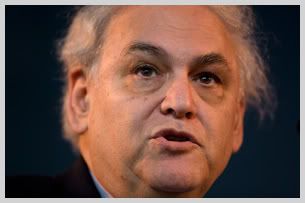 Richard Perle (born 1941). Currently: Resident fellow at the American Enterprise Institute, the think-tank with which he has been associated for 20 years. Widely known as "The Prince of Darkness," Perle was on the Defense Policy Board between 1987 and 2004 and served as its Chairman 2001-2003. He is a close ally of Wolfowitz and, like Wolfowitz, was a key cheerleader for the Iraq war. In the Reagan Administration, he was Assistant Secretary of Defense for International Security Policy, and worked for Senator Henry Jackson (1969-1980). He is a member or advisor for several conservative think-tanks, including the Center for Security Policy, the Hudson Institute, and the Washington Institute for Near East Policy. In 2006, he said he regretted his support of the Iraq invasion, blaming the "dysfunction" of the Bush administration for the mess there. Perle worked with Douglas Feith and David Wurmser to write strategic advice for the incoming Israeli Prime Minister Benjamin Netanyahu: "A Clean Break: A New Strategy for Securing the Realm." The document included many ideas that would later be included in PNAC white papers.
Richard Perle (born 1941). Currently: Resident fellow at the American Enterprise Institute, the think-tank with which he has been associated for 20 years. Widely known as "The Prince of Darkness," Perle was on the Defense Policy Board between 1987 and 2004 and served as its Chairman 2001-2003. He is a close ally of Wolfowitz and, like Wolfowitz, was a key cheerleader for the Iraq war. In the Reagan Administration, he was Assistant Secretary of Defense for International Security Policy, and worked for Senator Henry Jackson (1969-1980). He is a member or advisor for several conservative think-tanks, including the Center for Security Policy, the Hudson Institute, and the Washington Institute for Near East Policy. In 2006, he said he regretted his support of the Iraq invasion, blaming the "dysfunction" of the Bush administration for the mess there. Perle worked with Douglas Feith and David Wurmser to write strategic advice for the incoming Israeli Prime Minister Benjamin Netanyahu: "A Clean Break: A New Strategy for Securing the Realm." The document included many ideas that would later be included in PNAC white papers.
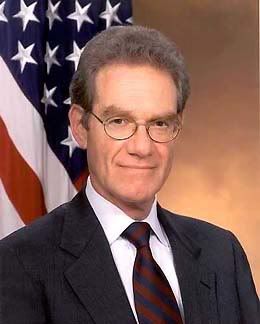 Peter W. Rodman (born 1943). Currently: Senior Fellow for Foreign Policy at the Brookings Institution. Served as Assistant Secretary of Defense for International Security under Donald Rumsfeld. A protégé of Henry Kissinger, for whom he worked at the National Security Council 1969-1977, Rodman drifted away from his mentor and into the arms of the neo-conservatives. Joined the Center for Strategic and International Studies in 1977, and served under Reagan where he was Director for Policy Planning at the State Department and as Deputy Assistant for National Security Affairs for both Reagan and G. H.W. Bush. He served as editor opf the right-wing National Review 1992-1999. He wrote the Russia chapter for "Present Dangers," Kristol and Kagan’s 2000 PNAC book.
Peter W. Rodman (born 1943). Currently: Senior Fellow for Foreign Policy at the Brookings Institution. Served as Assistant Secretary of Defense for International Security under Donald Rumsfeld. A protégé of Henry Kissinger, for whom he worked at the National Security Council 1969-1977, Rodman drifted away from his mentor and into the arms of the neo-conservatives. Joined the Center for Strategic and International Studies in 1977, and served under Reagan where he was Director for Policy Planning at the State Department and as Deputy Assistant for National Security Affairs for both Reagan and G. H.W. Bush. He served as editor opf the right-wing National Review 1992-1999. He wrote the Russia chapter for "Present Dangers," Kristol and Kagan’s 2000 PNAC book.
 William Schneider, Jr. (born 1941). Currently: Chairman of the Defense Science Board and State Department 's Defense Trade Advisory Group. He is President of International Planning Services, Inc. and an Adjunct Fellow of the Hudson Institute. In 1998, he served on the Commission to Assess the Ballistic Missile Threat to the United States, the first Rumsfeld Commission, which concluded that Iraq could within 10 years develop a ballistic missile capable of striking the U.S. He is one of the staunchest advocates of using tactical nuclear weapons against non-nuclear states. Schneider served as Under-Secretary of State in the Reagan administration, and on Senate and House staffs in the 1960s and ‘70s.
William Schneider, Jr. (born 1941). Currently: Chairman of the Defense Science Board and State Department 's Defense Trade Advisory Group. He is President of International Planning Services, Inc. and an Adjunct Fellow of the Hudson Institute. In 1998, he served on the Commission to Assess the Ballistic Missile Threat to the United States, the first Rumsfeld Commission, which concluded that Iraq could within 10 years develop a ballistic missile capable of striking the U.S. He is one of the staunchest advocates of using tactical nuclear weapons against non-nuclear states. Schneider served as Under-Secretary of State in the Reagan administration, and on Senate and House staffs in the 1960s and ‘70s.
 John Vincent Weber (born 1952). Currently: Policy Chairman for the Romney for President Campaign. Weber is a former Congressman from Minnesota (1981–1993), a managing partner of the Washington, D.C. branch of lobbying firm Clark & Weinstock. and chairman of the National Endowment for Democracy, He is also a senior fellow at the Humphrey Institute at the University of Minnesota.
John Vincent Weber (born 1952). Currently: Policy Chairman for the Romney for President Campaign. Weber is a former Congressman from Minnesota (1981–1993), a managing partner of the Washington, D.C. branch of lobbying firm Clark & Weinstock. and chairman of the National Endowment for Democracy, He is also a senior fellow at the Humphrey Institute at the University of Minnesota.
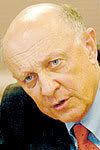 R. James Woolsey, Jr. (born 1941). Currently: Vice President at Booz Allen & Hamilton for Global Strategic Security. CIA Director (1993-1995). His book 50 Simple Steps to Save the Earth from Global Warming was published this year. Woolsey previously served in the U.S. government as Ambassador to the Negotiation on Conventional Armed Forces in Europe under G.H.W. Bush, Under Secretary of the Navy under Carter, and General Counsel to the U.S. Senate Committee on Armed Services during the Nixon Administration. He has served on the board of the Washington Institute for Near East Policy, and as a senior advisor for Americans for Victory Over Terrorism. Within hours of the 9/11 attacks,Woolsey appeared on television arguing that the Iraqis were involved. In July 2006, he said the U.S. should bomb Syria.
R. James Woolsey, Jr. (born 1941). Currently: Vice President at Booz Allen & Hamilton for Global Strategic Security. CIA Director (1993-1995). His book 50 Simple Steps to Save the Earth from Global Warming was published this year. Woolsey previously served in the U.S. government as Ambassador to the Negotiation on Conventional Armed Forces in Europe under G.H.W. Bush, Under Secretary of the Navy under Carter, and General Counsel to the U.S. Senate Committee on Armed Services during the Nixon Administration. He has served on the board of the Washington Institute for Near East Policy, and as a senior advisor for Americans for Victory Over Terrorism. Within hours of the 9/11 attacks,Woolsey appeared on television arguing that the Iraqis were involved. In July 2006, he said the U.S. should bomb Syria.
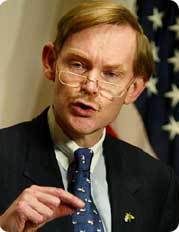 Robert Bruce Zoellick (born 1953). Currently: President of the World Bank. He was previously a Deputy Secretary of State and Trade Representative in the George Bush Administration. He was a member of the Defense Policy Board in the Clinton Administration. Although he signed the PNAC letter to Clinton, he was widely viewed as a "realist" in foreign policy, not a neo-conservative. In 2000, Zoellick served as a foreign policy advisor to Bush as part of a group, led by Condoleezza Rice, that called itself The Vulcans. He was involved with the administration’s efforts to produce a Darfur peace plan.
Robert Bruce Zoellick (born 1953). Currently: President of the World Bank. He was previously a Deputy Secretary of State and Trade Representative in the George Bush Administration. He was a member of the Defense Policy Board in the Clinton Administration. Although he signed the PNAC letter to Clinton, he was widely viewed as a "realist" in foreign policy, not a neo-conservative. In 2000, Zoellick served as a foreign policy advisor to Bush as part of a group, led by Condoleezza Rice, that called itself The Vulcans. He was involved with the administration’s efforts to produce a Darfur peace plan.
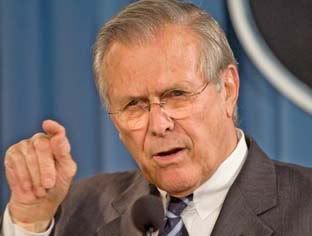 Donald Henry Rumsfeld: (born 1932). Currently: A senior fellow at the Hoover Institution at Stanford University. Rumsfeld was Defense Secretary under George Bush until November 8, 2006, when he resigned under broad pressure from generals and some of his former colleagues at PNAC. He chaired the 1998 Commission to Assess the Ballistic Missile Threat to the United States and the 1999 Space Commission. He served under the first Bush administration, under Reagan, Ford (as Defense Secretary) and Nixon. Prior to that, he was a two-term Congressman. Within hours of the 9/11 attack, Rumsfeld told aides to get the; "best info fast. Judge whether good enough hit S.H. [Saddam Hussein] at same time. Not only UBL [Osama bin Laden].
Donald Henry Rumsfeld: (born 1932). Currently: A senior fellow at the Hoover Institution at Stanford University. Rumsfeld was Defense Secretary under George Bush until November 8, 2006, when he resigned under broad pressure from generals and some of his former colleagues at PNAC. He chaired the 1998 Commission to Assess the Ballistic Missile Threat to the United States and the 1999 Space Commission. He served under the first Bush administration, under Reagan, Ford (as Defense Secretary) and Nixon. Prior to that, he was a two-term Congressman. Within hours of the 9/11 attack, Rumsfeld told aides to get the; "best info fast. Judge whether good enough hit S.H. [Saddam Hussein] at same time. Not only UBL [Osama bin Laden].


